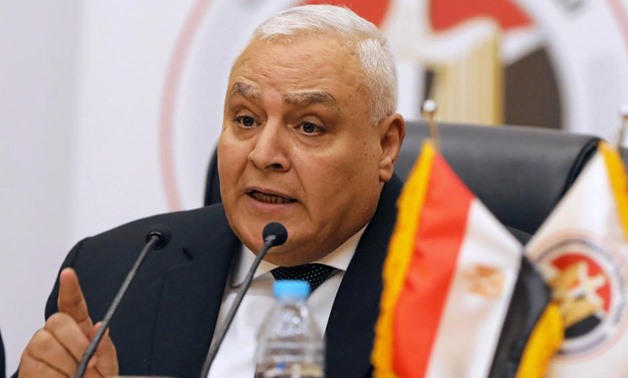
Head of the National Election Authority (NEA), Lasheen Ibrahim, speaks during a news conference in Cairo, Egypt January 8, 2018. REUTERS/Mohamed Abd El Ghany
CAIRO – 10 January 2017: The National Electoral Authority (NEA) issued the rules for local and international media wishing to cover the 2018 Presidential Elections. Media outlets are allowed to cover the polling and counting the votes.
State-owned media must treat all candidates equally in terms of coverage time. The NEA would take any necessary measures if that rule is breached.
If any medium is to publish/broadcast any opinion polls on candidates, it has to indicate the source of funding, the poll questions, the sample size and method, the data collection process and its date. The media must refrain from publishing/broadcasting any opinion polls five days before voting starts until it ends.
Media operating in Egypt should produce objective, fair and balanced stories on candidates, and the election process.
Applications will be submitted to the Supreme Media Council, the National Media Authority and the National Press Authority. Once these entities verify the licenses of applicant media to operate in Egypt, a list with the names of media outlets will be submitted to the NEA by January 25.
International media and their subsidiaries in Egypt should submit their applications to the State Information Service (SIS) by January 13. Permits would be issued by the NEA to correspondents by March 5.
Correspondents must be first allowed entry to polling locations by the head of the monitoring committee. They are prohibited from talking to voters, officials running and monitoring the election process, and candidates' representatives inside the polling location.
Correspondents should not remain inside the location for more than 30 minutes. The head of the monitoring committee has the right to remove them from the premise during busy times. Correspondents should not ask voters queuing outside polling locations about the candidate they would vote for. Breaching any of the aforementioned rules grants the NEA the right of revoke permits.
The NEA increased the number of judges supervising the elections to 17,000, matching the number of polling locations in the country as the number of eligible voters increased — and a judge must be present in each location to supervise the process.
The number of citizens eligible to vote in the presidential election taking place in March is 58 million citizens until now; names can still be excluded or added as per legal guidelines.
The Ministry of Interior will be securing all polling locations and providing them with wheelchairs to help the elderly and disabled people.
The NEA announced on Monday the 2018 Presidential Elections timetable. Potential candidates are allowed to submit their applications between January 20 and 29. The final list of candidates will be announced on February 24.
Voting will take place for three days starting March 26 domestically, while it will begin on March 16 for expats from 9 a.m. to 9 p.m. in each country’s local time. The winning candidate will be announced on April 2.
According to Article 140 of the Egyptian Constitution, electoral procedures should begin a minimum of 120 days before the end of the current presidential term and the president-elect should be announced a minimum of 30 days before the end of the previous president’s term. The current presidential term will end in June 2018.
Electoral procedures consist of receiving and scrutinizing applications and appeals, as well as setting the electoral lists and campaign regulations.
The National Elections Authority is an independent institution running all types of elections and referenda in the country, currently chaired by Chancellor Lashin Ibrahim Mohamed, who also serves as vice-president of the Court of Cassation.
The NEA launched an official website for both the parliamentary and presidential elections. The new website aims to publish all the resolutions and recommendations pertaining to the elections, in addition to the voting guides for Egyptians inside and outside Egypt.
President Abdel Fatah al-Sisi is the sixth president of Egypt. He came to office in June 2014 after the revolution of June 30, which toppled former President Mohamed Morsi, who is affiliated with the now-outlawed Muslim Brotherhood.

Comments
Leave a Comment